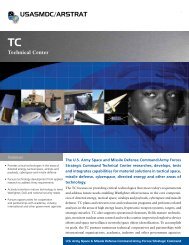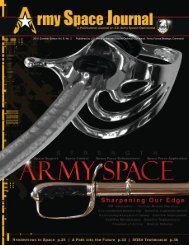Volume 2, Number 4 - Space and Missile Defense Command - U.S. ...
Volume 2, Number 4 - Space and Missile Defense Command - U.S. ...
Volume 2, Number 4 - Space and Missile Defense Command - U.S. ...
You also want an ePaper? Increase the reach of your titles
YUMPU automatically turns print PDFs into web optimized ePapers that Google loves.
egiment before their meeting. Poe reported that he <strong>and</strong><br />
House had discussed his gr<strong>and</strong>father. Descriptions of<br />
House show he was a student of literature <strong>and</strong>, from that,<br />
may have chosen Poe because they had similar interests.<br />
House was probably also familiar with Poe’s gr<strong>and</strong>father.<br />
The elder Poe was a popular quartermaster officer who,<br />
although he was actually a major, people referred to as<br />
“General” because he spent his own money to purchase<br />
supplies for his soldiers during the American Revolution.<br />
Traits of Poe’s people <strong>and</strong> leadership skills as a soldier<br />
can also be seen during this timeframe as he reunited<br />
with his family, came clean with the Army, <strong>and</strong> worked to<br />
find his place in the Army. Poe developed relationships<br />
based upon apparent hard work, honesty, trust, <strong>and</strong> mentorship<br />
with his officers. He was able to do that despite<br />
entering the Army using false information. If House’s<br />
intent in promoting Poe was to encourage him to remain<br />
in the Army, it is possible the strategy briefly worked. In<br />
December 1828, Lieutenant Colonel William J. Worth,<br />
(later the famous General Worth for whom Fort Worth,<br />
Texas, is named) returned to the regiment from his job at<br />
the Military Academy as the comm<strong>and</strong>ant of cadets. He<br />
had a great deal of influence on Poe.<br />
Needing to show Howard proof that he <strong>and</strong> John<br />
Allan had reconciled, Poe informed his parents that he<br />
had spent the last 18 months in the Army. John Allan<br />
responded indirectly that Poe should stay in the Army, so<br />
Poe eventually shifted by stating he wanted a discharge so<br />
that he could apply to West Point. Whether it was the idea<br />
of Poe going to West Point or the fact that Francis Allan<br />
died in February 1829 <strong>and</strong> John Allan felt some sympathy<br />
for Poe, John Allan requested that the Army grant Poe a<br />
discharge.<br />
After Poe left the Army in April 1829, he began a<br />
successful yearlong lobbying effort, asking then Secretary<br />
of War John Eaton for a class seat. Armed with letters<br />
of recommendation from Worth <strong>and</strong> other officers, John<br />
Allan, <strong>and</strong> Virginia politicians, Poe gained a cadet appointment<br />
from President Andrew Jackson. Worth’s example<br />
of swiftly rising from private to lieutenant in 1813 was<br />
probably the genesis of an idea that gave Poe an incorrect<br />
view of his upcoming Academy time. Poe believed<br />
his enlisted training would help him receive a commission<br />
within six months at West Point. He later learned he’d<br />
need to attend the entire four years.<br />
Most symbolic of Poe’s ability to influence was<br />
his final act of shaping both his military <strong>and</strong> personal<br />
futures. Poe excelled as a “model cadet,” ranking third<br />
in French <strong>and</strong> 17th in math while recording no disciplinary<br />
problems from July 1830 to January 1831. In the<br />
end, it was his failed relationship with his father — the<br />
same factor that led him to the Army — that caused him<br />
to leave the Army. Two critical events made Poe realize<br />
he would never retrieve his relationship with John Allan.<br />
First, Poe insulted John Allan over some rekindled money<br />
issues <strong>and</strong>, second, John Allan took Poe out of the family<br />
inheritance. Poe told John Allan in one of his final letters<br />
to his father that he would get out of West Point with or<br />
without the elder’s permission. Poe then purposely set out<br />
to gain a discharge. Poe’s last efforts ironically ensured the<br />
relationship’s end.<br />
That is Poe. And, in Poe, we find seeds of today’s<br />
soldier <strong>and</strong> Army.<br />
Allan died in 1834, <strong>and</strong> is only remembered for his<br />
relationship to Poe. And, while the name of Regimental<br />
Sergeant Major Edgar A. Perry (Poe) is perhaps familiar<br />
only to military history <strong>and</strong> literature buffs, Poe’s successes<br />
<strong>and</strong> failures are intrinsic to the fact that the name Edgar<br />
Allen Poe resonates to this day.<br />
Many criticisms exist among Poe biographers. Maybe<br />
Poe received a gratuitous promotion to sergeant major<br />
to add dignity similar to the way people promoted Poe’s<br />
gr<strong>and</strong>father to “general” years earlier. Maybe Poe used<br />
whatever means to get out of the Army because he<br />
despised it <strong>and</strong> was bored with it. Motives <strong>and</strong> exact circumstances<br />
are unknown. Comparing Poe as a soldier to<br />
a soldier of today is tough. Poe’s superiors, though, clearly<br />
recognized desired traits. He was intelligent, influential,<br />
resourceful, driven for success — an apparent st<strong>and</strong>out.<br />
He also mastered basic soldier traits at the time.<br />
One undisputed fact does remain. Poe outranked<br />
more than 400 regimental soldiers when the U.S. Army<br />
promoted him to its highest enlisted rank nearly 175 years<br />
ago. His failures — in his personal life with his father, <strong>and</strong><br />
at West Point — do not change this fact.<br />
References<br />
1. Arthur, Robert. History of Fort Monroe. Fort Monroe, Va.: Coast Artillery School<br />
Printing Plant, 1930.<br />
2. Allan Carlisle. “Sergeant Major Perry <strong>and</strong> Cadet Poe.” Infantry Journal, Nov. 1942,<br />
70-78.<br />
3. Duane, William. A H<strong>and</strong>book for Infantry. 9th ed. Philadelphia: Printed for the author,<br />
1814.<br />
4. Fisher, Jr., Ernest F. Guardians of the Republic: A History of the Noncommissioned<br />
Officer Corps of the U.S. Army. NY: Ballantine, 1994.<br />
5. Haskin, William L. The History of the First Regiment of Artillery. Portl<strong>and</strong>, ME:<br />
Thurston <strong>and</strong> Co., 1879.<br />
6. Helfers, Melvin C. Military Career of Edgar Allan Poe. Diss. Duke U. 1949.<br />
7. Lindsay, Phillip. The Haunted Man: A Portrait of Edgar Allan Poe. NY: Philosophical<br />
Library, 1954.<br />
8. Ostrom, John W., ed. The Letters Of Edgar Allan Poe. 2 Vols. NY: Gordian, 1966.<br />
9. Quinn, Arthur H. Edgar Allan Poe, A Critical Biography. NY: Appleton-Century Crofts,<br />
1948.<br />
10. Russell, J. Thomas. Edgar Allan Poe: The Army Years. West Point, NY: USMA, 1972.<br />
11. Silverman, Kenneth. Edgar Allan Poe: Mournful <strong>and</strong> Never-Ending Remembrance.<br />
NY: HarperCollins, 1991<br />
12. Spaulding, Oliver T. United States Army in War <strong>and</strong> Peace. NY: Putnam, 1937.<br />
13. Symons, Julian. The Tell-Tale Heart: The Life <strong>and</strong> Works of Edgar Allan Poe. NY:<br />
Harper, 1978.<br />
14. Von Weis, Susan A.T. “The Last Days of Poe.” Scribners Monthly Magazine, Mar.<br />
1876, 707-716.<br />
15. Wallace, Edward S. General William Jenkins Worth: Monterey’s Forgotten Hero. Dallas,<br />
Tx.: SMU P, 1953<br />
16. Woodberry, George W. “Poe’s Legendary Years.” Atlantic Monthly, Dec. 1884, 814-<br />
828.<br />
Fall 2003<br />
Army <strong>Space</strong> Journal<br />
57

















